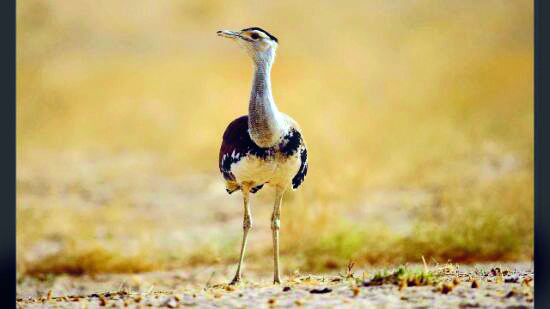Apex court moots idea of 'Project Great Indian Bustard' to save threatened birds

New Delhi: Coming to the rescue of the critically endangered Great Indian Bustard (GIB), the Supreme Court on Wednesday mooted the idea of launching 'Project GIB' on the lines of Project Tiger', which was started in 1973 to save the big cats, and sought the government's view on the proposal.
A bench headed by Chief Justice D Y Chandrachud also sought reports from the chief secretaries of Rajasthan and Gujarat in six weeks on installation of bird diverters in priority areas and assess the total length of transmission lines in the two states where under-grounding of electric wires have to be done to ensure the birds do not die of electrocution.
The great Indian bustard, considered India's most critically endangered bird species, is especially found in Rajasthan and Gujarat, and as per the 2021 report of the International Union for Conservation of Nature (IUCN), they are on the verge of extinction with hardly 50 to 249 of them alive.
"You (Attorney General R Venkataramani) can check with the Ministry of Environment, Forest and Climate Change. We had that Project Tiger, is it not possible to have some
mechanism to bring focus on GIB like having Project Great Indian Bustard", the bench, also comprising justices A S Bopanna and V Ramasubramanian, said.
The bench asked the attorney general to take instruction and apprise the court about it.
The central government had launched 'Project Tiger' on April 1, 1973 to promote conservation of the big cat whose population had dipped alarmingly.
The top court, which was hearing a PIL seeking several directions to save the GIB, had earlier directed the Gujarat and Rajasthan governments to convert overhead electric cables into underground power cables, wherever feasible, and install bird diverters in priority areas where the birds live.
It had also set up a three-member committee to assess the feasibility of laying high-voltage underground power cables.
The committee comprises scientists Rahul Rawat, Sutirtha Dutta and Devesh Gadhavi, deputy director of Corbett Foundation.
On Wednesday, the bench said in its order: "The chief secretaries of Rajasthan and Gujarat will assess the total length of transmission lines, the estimated number of bird diverters needed to be installed in priority areas."
It directed the committee to submit an updated status report on steps to safeguard the GIB.
It said the Centre's plea seeking modification of the earlier order on the composition of the committee to include additional secretary of Renewable Energy Department and the COO (chief operating officer) of the Central Transmission Utility of India Ltd will be taken up later, if needed.
"We only clarify that the committee may take the expert opinion of the COO of CTUIL (Central Transmission Utility of lndia Ltd ). Once the updated status report of the committee is filed, a further view can be taken (on Centre's plea). An updated status report shall be filed within the next six weeks," it directed.
"All bird diverters shall be in compliance with the quality required by the committee appointed by this court," the bench said in its order.
During Wednesday's hearing, the bench perused the status reports filed by Rajasthan and Gujarat in pursuance of its earlier directions with regard to electric cables and bird diverters.
The attorney general and Additional Solicitor General Aishwarya Bhati, appearing for the Centre, suggested three more domain experts be included in the apex court-appointed panel to deal with various aspects related to undergrounding of power cables and installation of bird diverters.
The bench said, at the moment, it would say the technical committee will be at liberty to consult any domain expert.



